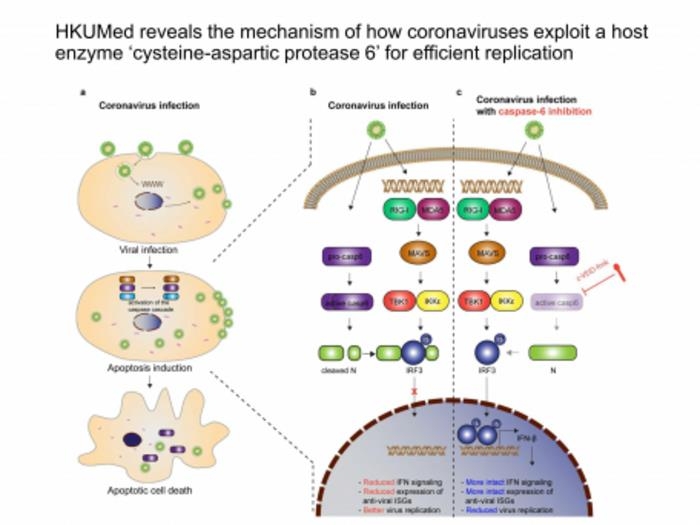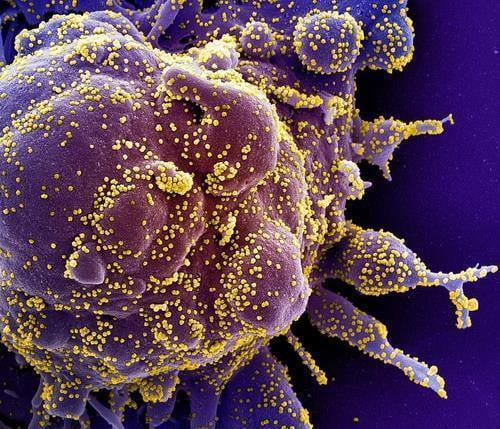Caspase 6, interferon regulatory factor interferes with ‘entering the cell nucleus’ → promotes virus replication
A new corona treatment target injury… Researchers at the University of Hong Kong, thesis in the journal ‘Nature’
–
Caspase is a protease (proteolytic enzyme) essential for programmed cell death.
When caspases are activated, cell death occurs as cellular components are degraded.
This type of programmed cell death, which causes little damage to its surroundings, can play an important role in protecting the organism from pathogen infection or stress.
In fact, caspase deficiency can also cause tumorigenesis.
However, excessive activation of some caspases causes excessive programmed cell death, as seen in neurodegenerative diseases such as Alzheimer’s disease.
Corona virus such as novel coronavirus (SARS-CoV-2), MERS (MERS-CoV), and SARS (SARS-CoV-1) use host cell caspase 6 (cysteine-aspartic acid protease 6) for self-replication came out as a result of the study.
This means that when these highly contagious and severe coronaviruses become infected, they multiply by using the host cell’s virus defense system against it.
Originally, caspase 6 is required to trigger ‘apoptosis’, or ‘apoptosis’, which prevents the spread of infection by the virus.
Apoptosis, a type of programmed cell death, refers to cell death due to cell expansion and cracking, cell membrane changes, nuclear fragmentation, and chromosome cleavage.
Unlike necrosis, in which cells die due to sudden damage, apoptosis does not harm the organism, but rather has a beneficial effect on the life cycle.
The results of this study conducted by scientists at the University of Hong Kong Medical School were published as a paper in the journal Nature on the 3rd (local time).

–
The transmission power and pathogenicity of the new coronavirus that has brought the ‘corona pandemic’ is different from the SARS (severe acute respiratory syndrome) and MERS (Middle East respiratory syndrome) viruses that appeared earlier.
However, infection with any of these coronaviruses results in significant apoptosis.
It suggests that there is a link between infection of these coronaviruses and apoptosis of host cells.
When a coronavirus is infected, the host cells secrete interferon by stimulation of the genetic material contained in RNA.
Interferon inhibits viral replication within infected cells and reduces the spread of the virus to surrounding intact cells.
Apoptosis of infected host cells also has the meaning of blocking itself from becoming the ‘factories of viral replication’ of the virus.
In other words, apoptosis and interferon responses of infected cells are the most important viral defense mechanisms.
It is caspase that triggers apoptosis when a virus invades cells of animals, including humans.
The Hong Kong Medical University research team tested the effects of caspase 6 on coronavirus replication in cultured cell lines, human lung tissue, intestinal organoids, and animal models.
The use of a caspase-6 inhibitory chemical in a mouse model dramatically limited replication of the MERS virus and raised the survival rate from 33.3% to 80%.
Mice in which the caspase 6 gene was removed also significantly reduced MERS virus replication and lung tissue damage.
Administration of caspase 6 inhibitors to hamsters infected with the new coronavirus also significantly reduced viral replication and inflammatory damage to the lungs.
The research team also confirmed the mechanism by which the coronavirus uses caspases for replication.
Caspase 6 acted as a catalyst to block the interferon response of host cells.
When caspase 6 cleaves the nucleocapsid of the coronavirus, the resulting protein fragment blocks IRF3 (interferon regulatory factor 3) from entering the cell nucleus.
In other words, a fragment of the nucleocapsid protein of the coronavirus acted as an antagonist of interferon, which promoted viral replication.
Nucleocapsid refers to the nucleic acid of a virus and the protein membrane surrounding it.
The study shows how coronaviruses have overpowered human cells’ defenses and evolved into dangerous pathogens.
It goes without saying that caspase 6 has emerged as a potential target for therapeutic development.
Developing a therapeutic agent targeting this enzyme could be applied to all coronaviruses known to infect humans so far, the research team emphasized.
/yunhap news
–


